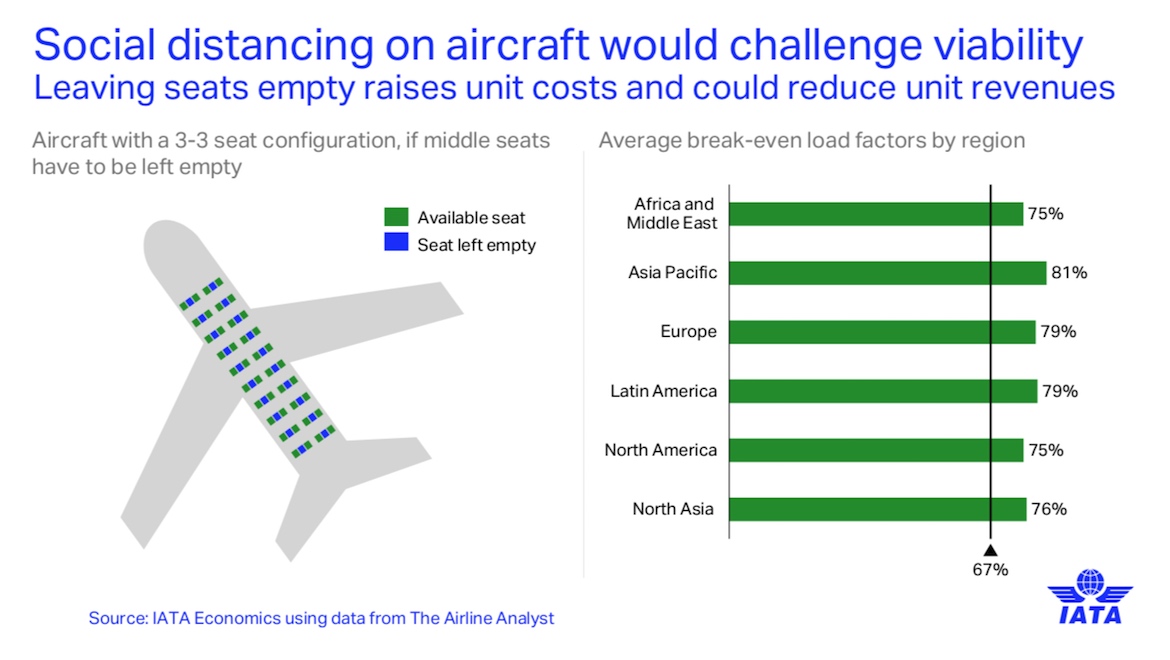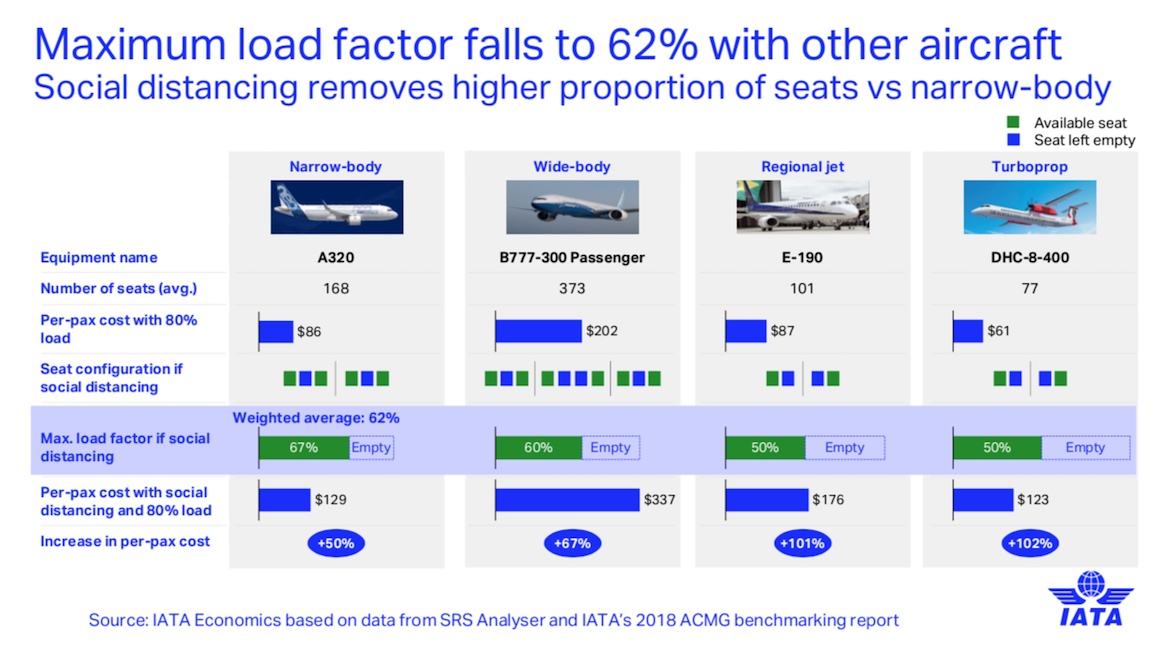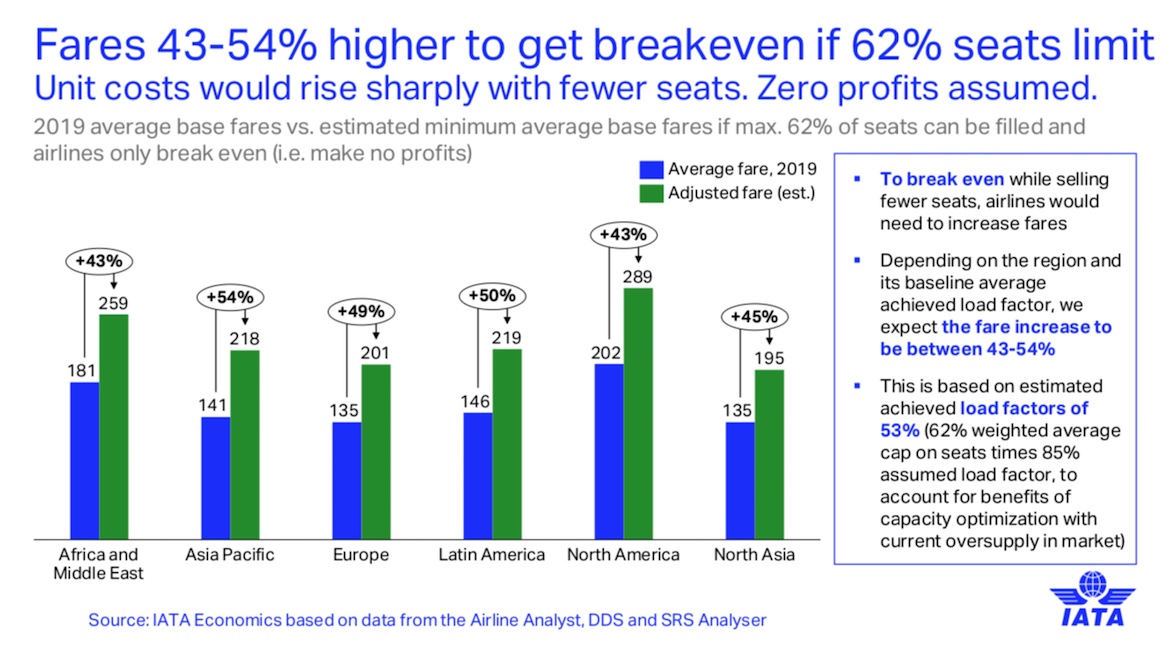News
IATA warns empty middle seat means higher fares
May 8th 2020
The International Air Transport Association (IATA) said ticket prices could jump by 50% if regulators are to persist with social distancing rules such as the blocking of middle seats on aircraft. Read More »
Several governments have mandated airlines fly with restricted capacity as part of efforts to slow the spread of the coronavirus. COVID-19 has infected about 3.8 million people and resulted in some 269,000 deaths, figures from Johns Hopkins University have reported.
IATA chief economist, Brian Pearce, said the rules meant the average maximum load factor for a narrow-body aircraft would be 67%, with the figure falling to 60% for some wide-bodies and 50% for some regional jets and turboprops. The weighted average maximum load factor across different fleet types was 62%.
Figures from IATA, taken from a sample of 122 airlines, calculated only four of the participating carriers would have made money under such rules, i.e. at the operating or earnings before interest and tax (EBIT) level, in 2019.
"The likelihood is that at the early stages of the recovery fares will be low because of low fuel prices, because of excess capacity, because of weak demand," Pearce said in a conference call with journalists this week. "Airlines will need to stimulate demand."
"The trouble is, if we have these restrictions on middle seats it will mean a very substantial increase in unit costs,” he said.
“Without the ability to pass on those costs in higher fares, which is unlikely to be the case in the early stages, I think it is going to mean many airlines, many operations, are going to struggle to be financially viable.
"In the longer term, once we see demand rebounding to stronger levels and there is some pricing power in the market, if these restrictions are persistent then that implies the cost of air travel will be significantly higher than we have seen before."
The airline industry body said the average industry breakeven load factor was 77%.
Based on estimated achieved load factors of 53%, airlines would need to increase fares between 43% and 54% to break even, IATA said.
Many airlines have or are planning to introduce social distancing rules on flights. This week Malaysia Airlines Berhad (MAB) and its affiliates, MASwings and Firefly, introduced capacity restrictions on all flights as required under recently introduced government regulations.
On its website, MAB said it would limit passengers on each flight to half of the maximum capacity of the operating aircraft, introduce line markings for social distancing and observe one metre distancing between passengers, among other measures, at check in, boarding and arrival.
Bangkok Airways said it would implement seat distancing on its flights when domestic services resumed on May 15 to comply with safety measures and social distancing guidelines set by the Ministry of Public Health and the Civil Aviation Authority of Thailand.
Other carriers with capacity restrictions that have effectively blocked the middle seat included Alaska Airlines, Delta Air Lines, Southwest Airlines, Qantas and Virgin Australia.
Rather than empty middle seats, IATA supported mandatory face-coverings for passengers and masks for crew among a package of measures to reduce the risk of contracting COVID-19 on board an aircraft.
The other temporary biosecurity measures being proposed included temperature screening of passengers, airport workers and travellers; boarding and disembarkation processes that reduced contact with other passengers and crew; limiting movement within the cabin during flight; more frequent and deeper cabin cleaning and simplified catering procedures that reduced crew movement and interaction with passengers.
IATA said testing of passengers or immunity passports could be included as temporary biosecurity measures "when proven and available at scale".
"Work on all of these is promising. But none will be realised before we will need to restart the industry," IATA director general and CEO, Alexandre de Juniac said in a statement.
"It’s why we must be ready with a series of proven measures in a combination that will reduce the already low risk of inflight transmission."
 |
 |
 |